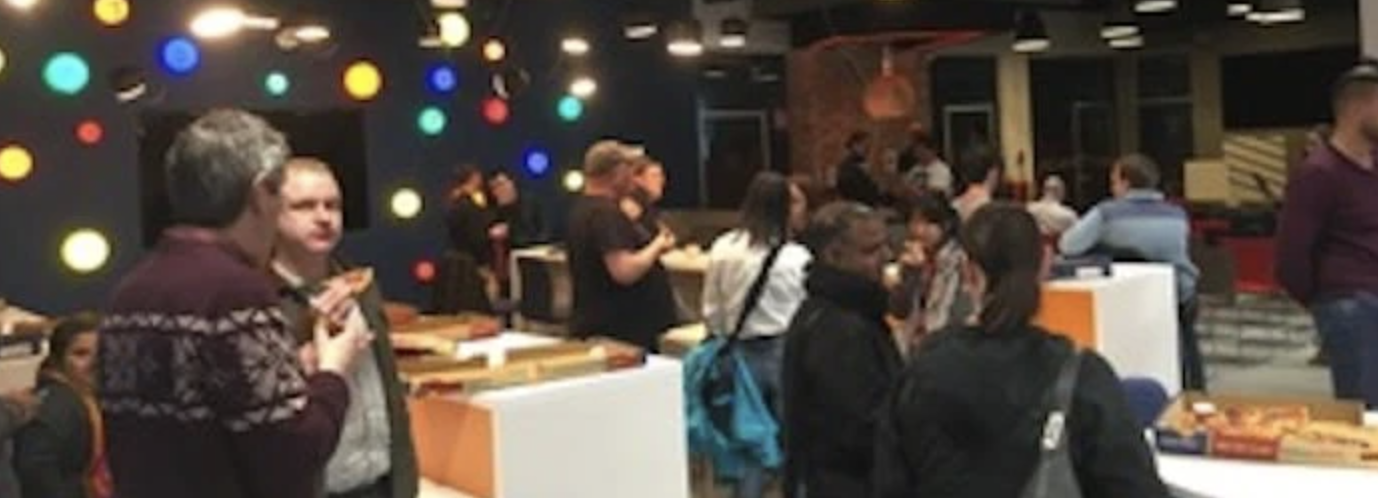Hosted by Peter Elger and Keelin Murphy
At the fourth Cork AI meetup sponsored by fourTheorem, Sarah Kate Sweeney and Richard Rodger gave their unique outlook on venturing into AI. Unlike previous meetups, this event was held at a new location in the Bank of Ireland workbench facility. Of course, delicious beer and pizza were still supplied to all the attendees!
Vespa
Following introductions from hosts Keelin Murphy and Peter Elger, Richard Rodger began breaking down how he has adapted to the AI revolution. Richard uses an open source tool powered by Yahoo called Vespa.ai to tackle machine learning from an engineering perspective rather than taking a mathematical approach.
Vespa has been in production since 1999, and was derived from the alltheweb.com codebase but has been refactored, remodeled, and modernized since then. It provides search capabilities to Flickr, as well as Yahoo News, Sports, Finance and Advertising. Vespa is exceptionally good at multidimensional matrix operations. Richard rates Vespa for its practicality and high quality search results over alternatives such as Elastic Search, Algolia and Solr. Vespa handles all of the underlying machine learning infrastructure; all you need to do is apply your Tensors and you’re ready to go!
Richard explained that Vespa balances Recall and Precision better than competitors by using machine learning to drive search ranking. Vespa works by storing a tensor representing the user’s behavior pattern over time and another tensor representing the Vespa model’s understanding of what’s right and wrong. By merging these two tensors together, Vespa then returns the ideal rank extremely quickly. So it is essentially just matrix multiplication.
To hear more about the Vespa application for development and operations check out Richard’s meetup presentation below.
Chatbot
Next up was Sarah Kate Sweeney. Sarah is only 16 years old and, in addition to reaching grade 5 in piano, has a huge interest in AI. Amazing right?
In 2011, when Sarah was 9 years old, her interest was sparked by her father who took her to a Coderdojo and she began learning Python. He had an iPhone with Siri installed, and Sarah decided she wanted to build her own version of a chatbot which she duly did, naming it LILA. In the beginning, LILA wasn’t exactly artificially intelligent but was able to respond to a variety of basic questions.
Wind forward a few years, and Sarah had to come up with a project for the Little Young Scientist Ireland program. She remembered her friend LILA, did some research on how she could make LILA smarter, and came across Machine Learning. After learning more about neural networks, LILA morphed into ALAN. The name Alan comes from Sarah’s hero Alan Turing, who was the founder of modern computer science. Although ALAN couldn’t answer every question posed to him, he was capable of answering many and brought Sarah’s hero to life.
Throughout Sarah’s talk she showed her understanding of the relationship between percetrons and neural networks, whilst at the same time applying real world examples to make it more easily understandable for the audience. Sarah’s love of music and tech is leading her towards a career in the musical tech sector. We at fourTheorem would like to wish Sarah the best of luck in her endeavours and are certain she will go far in whatever career path she decides to take!
Thanks to all who attended Cork AI #4 and we look forward to seeing you next month for #5, stay tuned!
To share your thoughts, or to speak to a member of the fourTheorem team, get in touch today.

